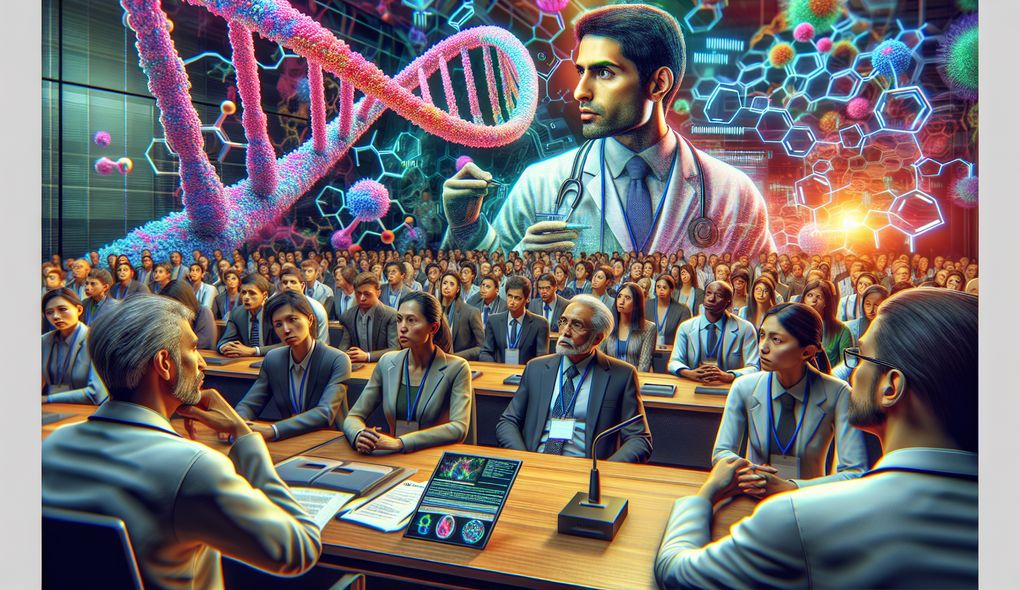How do you collaborate with a multidisciplinary team in designing and evaluating targeted cancer therapies?
INTERMEDIATE LEVEL

Sample answer to the question:
In collaborating with a multidisciplinary team in designing and evaluating targeted cancer therapies, I believe communication and teamwork are essential. I ensure that I have clear and open lines of communication with my colleagues from diverse backgrounds, including clinicians, molecular biologists, geneticists, and bioinformaticians. We regularly meet to discuss our goals, progress, and challenges. I also actively participate in team meetings, contribute ideas, and provide input based on my expertise in cancer biology and molecular genetics. Additionally, I am skilled in organizing and interpreting complex scientific data, which allows me to contribute effectively to the evaluation and design of targeted cancer therapies.
Here is a more solid answer:
In my role as a Molecular Oncologist, I collaborate closely with a multidisciplinary team to design and evaluate targeted cancer therapies. I bring my expertise in cancer biology and molecular genetics to the table, allowing me to contribute effectively to discussions and decision-making. For example, when designing a targeted therapy, I work with clinicians to understand the specific needs of patients and select the most appropriate molecular targets. I also collaborate with molecular biologists and geneticists to develop advanced diagnostic tools, utilizing my knowledge of cancer biology to identify specific genetic alterations that can guide therapy selection. Furthermore, I have experience in organizing, analyzing, and presenting complex scientific data, which is crucial for evaluating the effectiveness of targeted therapies. I regularly present my findings to the team, ensuring that everyone is informed and involved in the evaluation process.
Why is this a more solid answer?
The solid answer provides specific examples of how the candidate collaborates with a multidisciplinary team, highlighting their expertise in cancer biology and molecular genetics. They mention working closely with clinicians, molecular biologists, and geneticists to design targeted therapies and develop diagnostic tools. The candidate also emphasizes their ability to organize and present complex scientific data, which is important for evaluating targeted cancer therapies. However, the answer can be further improved by providing more details about their communication and interpersonal skills.
An example of a exceptional answer:
Collaborating with a multidisciplinary team in designing and evaluating targeted cancer therapies is a vital aspect of my role as a Molecular Oncologist. I firmly believe in fostering a collaborative and inclusive environment where every team member's expertise is valued. To achieve this, I actively engage in regular meetings and discussions with clinicians, molecular biologists, geneticists, and bioinformaticians. By maintaining open lines of communication, we can collectively leverage our diverse knowledge and experience to ensure the development of effective targeted therapies. For instance, when designing a therapy, I collaborate closely with clinicians to understand the clinical needs of patients and tailor the treatment accordingly. I also work closely with molecular biologists to analyze cancer samples and identify specific genetic alterations that can serve as therapeutic targets. In addition to my expertise in cancer biology and molecular genetics, I excel in organizing and interpreting complex scientific data. This allows me to contribute significantly to the evaluation of targeted cancer therapies, providing insights that drive decision-making. By presenting my findings in team meetings and conferences, I ensure that all relevant stakeholders are informed and involved in the evaluation process. Overall, my collaborative approach, strong communication skills, and ability to organize and interpret complex scientific data make me an asset to any multidisciplinary team working on targeted cancer therapies.
Why is this an exceptional answer?
The exceptional answer not only provides specific examples of how the candidate collaborates with different team members but also emphasizes their commitment to fostering a collaborative and inclusive environment. They highlight their ability to tailor treatments based on the clinical needs of patients and their role in analyzing cancer samples. The candidate also recognizes the importance of presenting findings to relevant stakeholders to ensure informed decision-making. The answer reflects a strong understanding of the job requirements and effectively showcases the candidate's skills and experience in a multidisciplinary setting.
How to prepare for this question:
- Familiarize yourself with the specific responsibilities mentioned in the job description, such as designing and evaluating targeted cancer therapies.
- Research the latest advancements in cancer biology and molecular genetics to demonstrate your knowledge and stay up to date.
- Prepare examples of past collaborations with multidisciplinary teams, highlighting your communication, teamwork, and problem-solving skills.
- Practice presenting complex scientific data in a clear and concise manner, as this skill is crucial for evaluating targeted cancer therapies.
What are interviewers evaluating with this question?
- Expert knowledge of cancer biology and molecular genetics.
- Excellent communication and interpersonal skills
- Ability to organize, interpret, and present complex scientific data

